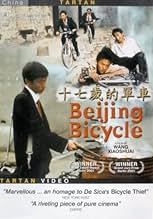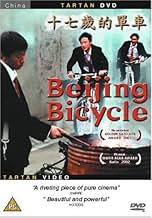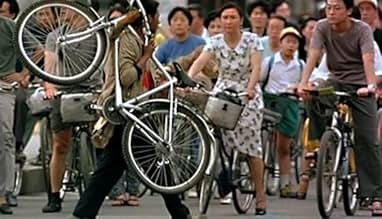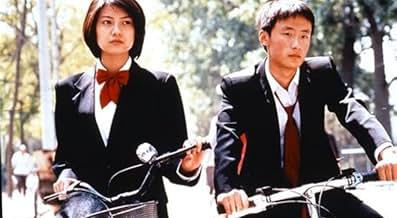AVALIAÇÃO DA IMDb
7,2/10
4,8 mil
SUA AVALIAÇÃO
Adicionar um enredo no seu idiomaA seventeen-year-old country boy working in Beijing as a courier has his bicycle stolen, and finds it with a schoolboy his age.A seventeen-year-old country boy working in Beijing as a courier has his bicycle stolen, and finds it with a schoolboy his age.A seventeen-year-old country boy working in Beijing as a courier has his bicycle stolen, and finds it with a schoolboy his age.
- Prêmios
- 2 vitórias e 10 indicações no total
Lin Cui
- Guo Liangui
- (as Cui Lin)
Guancheng Liu
- Mantis
- (as Lei Liu)
Avaliações em destaque
Beijing Bicycle by Sixth Generation director Wang Xiaoshuai is an unsettling look at modern China in transition that depicts the relationship between two young men of different social status, both yearning for acceptance and stubbornly determined to succeed. Guei (Cui Lin) is an unexpressive working class 17-year old who has come to Beijing to find work, while Jian (Li Bin), is a sophisticated middle-class student, desperate to belong, seeking approval from his biker friends and his beautiful girlfriend Gin (Zhao Yiwel). The film explores the consequences when Guei's bicycle is stolen and ends up in Jian's hands. The bicycle represents an escape for both from the competitive pressures of their lives. For Guei, it is a means of access to a job, an income, and survival. For Jian, it is the pathway to being "cool" and being in the in-group, much like what the flashy sports car represents to young men in Western countries.
As the film opens, a group of boys are being interviewed for a job as a courier. Enticed by the prospect of owning a silver mountain bike, Guei takes the job and begins to save money to buy the bike, given to him as a loan (the bike is his once he has earned 700 yuan, which is about $85). Out of his element in the bewildering city, Guei runs into an awkward situation almost immediately when he makes a delivery in a luxury hotel and is directed to the gym where he is forced to strip for a shower before he can deliver his package. He is then asked to pay for the shower when he leaves but does not have enough money. When his bike is stolen just one day before he can become the owner, Guei's job is threatened.
Xie Jian as Guei's manager is both abrasive and compassionate and offers to take Guei back to work if he can find his bike. In a city where bicycles are still the most common means of transportation, against all odds he sets out to find it. The film is about the bicycle but is also about the city of Beijing. Guei's search for the bicycle takes him into all corners of the city. With an original score by Felix Wang and magnificent cinematography by Jie Liu, the city comes alive with streets littered with traffic juxtaposed with mysterious alleys where old men play board games or do Tai Chi. Wang adds the little touches as well such as two friends sharing a toothbrush and a single spigot of water in an alley serving an entire neighborhood.
Like De Sica's The Bicycle Thief, the stolen bicycle is central to the story, but here it is not about the hunt but about the consequences that follow from its recovery. When the student Jian is found with the bike, both he and Guei assert ownership and the bike is stolen and reclaimed by both boys several times, each time ending in a scuffle with Jian's friends. In a powerful confrontation with his father, Jian, in a rage against his father for reneging on his promise to buy him a bike, finally admits to stealing his father's money to purchase the bike himself at the flea market after it was fenced. The two boys are pitted against each other but mutual need brings them together and allows them to work out a compromise by alternating the days when each can use the bike. Eventually a serious confrontation takes place that escalates into a startling conclusion.
Beijing Bicycle is a deeply human odyssey that, while somewhat repetitive, never loses its rhythm. Though there is little dialogue and the characters communicate mostly with body language, long silences, and facial expressions, the actors perform their roles with astonishing authenticity. Parts of the film are emotionally upsetting, but there is also a sweet innocence at play. Jian acts like a typical adolescent-surly, angry with his parents, shy with girls, audacious and impetuous one minute, and then needy and contrite the next. In one of the concluding scenes, as a group of punks chase two boys through a an older section of Beijing; one says to the other, "What are you doing? This doesn't concern you." The other replies, "I don't know my way out." In today's new China, caught between the traditions of an ancient culture and the new urban reality, young people are having trouble finding their way out.
As the film opens, a group of boys are being interviewed for a job as a courier. Enticed by the prospect of owning a silver mountain bike, Guei takes the job and begins to save money to buy the bike, given to him as a loan (the bike is his once he has earned 700 yuan, which is about $85). Out of his element in the bewildering city, Guei runs into an awkward situation almost immediately when he makes a delivery in a luxury hotel and is directed to the gym where he is forced to strip for a shower before he can deliver his package. He is then asked to pay for the shower when he leaves but does not have enough money. When his bike is stolen just one day before he can become the owner, Guei's job is threatened.
Xie Jian as Guei's manager is both abrasive and compassionate and offers to take Guei back to work if he can find his bike. In a city where bicycles are still the most common means of transportation, against all odds he sets out to find it. The film is about the bicycle but is also about the city of Beijing. Guei's search for the bicycle takes him into all corners of the city. With an original score by Felix Wang and magnificent cinematography by Jie Liu, the city comes alive with streets littered with traffic juxtaposed with mysterious alleys where old men play board games or do Tai Chi. Wang adds the little touches as well such as two friends sharing a toothbrush and a single spigot of water in an alley serving an entire neighborhood.
Like De Sica's The Bicycle Thief, the stolen bicycle is central to the story, but here it is not about the hunt but about the consequences that follow from its recovery. When the student Jian is found with the bike, both he and Guei assert ownership and the bike is stolen and reclaimed by both boys several times, each time ending in a scuffle with Jian's friends. In a powerful confrontation with his father, Jian, in a rage against his father for reneging on his promise to buy him a bike, finally admits to stealing his father's money to purchase the bike himself at the flea market after it was fenced. The two boys are pitted against each other but mutual need brings them together and allows them to work out a compromise by alternating the days when each can use the bike. Eventually a serious confrontation takes place that escalates into a startling conclusion.
Beijing Bicycle is a deeply human odyssey that, while somewhat repetitive, never loses its rhythm. Though there is little dialogue and the characters communicate mostly with body language, long silences, and facial expressions, the actors perform their roles with astonishing authenticity. Parts of the film are emotionally upsetting, but there is also a sweet innocence at play. Jian acts like a typical adolescent-surly, angry with his parents, shy with girls, audacious and impetuous one minute, and then needy and contrite the next. In one of the concluding scenes, as a group of punks chase two boys through a an older section of Beijing; one says to the other, "What are you doing? This doesn't concern you." The other replies, "I don't know my way out." In today's new China, caught between the traditions of an ancient culture and the new urban reality, young people are having trouble finding their way out.
Too long? Don't be absurd: there's not a single moment that could profitably have been cut. The details of Beijing life we see may or may not "develop character" or "advance the story", but they're worth watching all by themselves, and Wang only includes those details which he correctly senses are not out of place. This is a film as sturdily and artfully made as the bicycle of the title, and it's simply a pleasure - a rare pleasure, unfortunately - to see dialogue, images, music and incidental sound fitting together so nicely. The long stretches with no dialogue at all are as communicative as they need to be and anything but contrived. I probably wouldn't even have noticed them if it hadn't been for the fact that I didn't speak Mandarin and was thus relieved not to have to read subtitles.
It's amazing how much Wang manages to convey in what is, after all, a very short time (just 113 minutes). I even got a sense of why so many people were willing to align themselves with Qin (the one who either stole the bicycle from Guo or bought it from the real thief with stolen money - we're never entirely certain), even though he comes across as perhaps the least worthwhile person in the world. When his friends offer to help him retrieve the bicycle - and later on, as they try to retrieve it - they have the air of people who know they're in the wrong, who are trying to justify their mistaken decision to waste energy on the wrong person by wasting still more energy. We get a similar sense from Qin's suitor, Xiao, and even from Qin's family. We get a strong sense of the society in which all of these people live and of how the world must appeal to them.
And even though there may be no "closure" at the end - although I don't know what "closure" is and I suspect that people who use the word probably don't either - few films are quite as satisfying.
It's amazing how much Wang manages to convey in what is, after all, a very short time (just 113 minutes). I even got a sense of why so many people were willing to align themselves with Qin (the one who either stole the bicycle from Guo or bought it from the real thief with stolen money - we're never entirely certain), even though he comes across as perhaps the least worthwhile person in the world. When his friends offer to help him retrieve the bicycle - and later on, as they try to retrieve it - they have the air of people who know they're in the wrong, who are trying to justify their mistaken decision to waste energy on the wrong person by wasting still more energy. We get a similar sense from Qin's suitor, Xiao, and even from Qin's family. We get a strong sense of the society in which all of these people live and of how the world must appeal to them.
And even though there may be no "closure" at the end - although I don't know what "closure" is and I suspect that people who use the word probably don't either - few films are quite as satisfying.
Beyond the plot that reminds me of neorealistic style, imho this is a film about the contrast between the ex-peasants and the big city.
The formerly peasants who came from the rural areas are the only positive characters of the movie; the guy struggle to keep naive as he can, but ultimately the violence and the opportunism of the city catches him. A masterpiece.
"Beijing Bicycle" (Chinese, 2002): This is one of the purest films I've seen all year. Don't believe the blurb written about it: two boys learn sharing through the use of one bicycle. The blurb couldn't be MORE WRONG. This story has one of the smoothest, most linear, singularly focused goals I've experienced in a film along with "The Field", which I rewatched earlier this year. There are no plot twists, no what-ifs, no "oh my god, I had no idea THAT was happening!" moments. "Beijing Bicycle" is a simple, yet symbolic film about a young man who comes to the big city, gets a job as a bicycle messenger, and things quickly go from uncomfortable, to bad, to awful, to worse it seems. "Guei" (the messenger) wasn't raised to recognize the ways of a metropolis, which tries to chew him up piece by piece. We get to "know" other characters who we believe (along with Guei) ARE who they appear to be. "Beijing Bicycle" has to be the finest expression of what I would expect to be the current set of fears by those in China who see their future as an unknown, with the "replacement model" being the U.S.A.. This story expresses the huge doubts caused by the loss of Mao and the Communist way of life. Even if it WASN'T perfect, they were familiar with it, and many of these "new world" things did not happen THEN. Those who are (literally) "buying" into the free market concepts, are losing their pride, identities, and souls. Watch for the slow, steady transitions of situations and characters. Watch for the symbols of decadence, greed, unhealthy living, improper greed, corruption, and sadness all within a small group of teens.
When you read a synopsis of Beijing Bicycle, it may remind you of Vittorio de Sica's 1948 masterpiece The Bicycle Thieves. A poor man, having recently come to the city from the country, wins a job at a bicycle courier business, and, on a delivery, gets his bike stolen. He then proceeds to search the city of Beijing to retrieve it. Luckily, it quickly veers away from being a simple update of that classic story. He finds the alleged thief, a high school kid, and steals it back. For the first hour or more, the bike moves back and forth between them. The two characters are compared and contrasted, and it works as an effective class study.
The direction and editing are particularly great in the film. The climax involves two intersecting chases, and it is one of the best stages sequences I've ever seen. There are a couple of problems, small ones for me, but perhaps big ones for critics and audiences. The high school kid is extraordinarily unlikable. A person behind me declared loudly, "What a brat!" And he is. I personally don't mind if a character is unsympathetic (although we are asked to sympathize with him, I believe). My own biggest problem is that the ending is slightly unsatisfactory. There's not much closure. Still, Beijing Bicycle is an excellent film. 9/10.
The direction and editing are particularly great in the film. The climax involves two intersecting chases, and it is one of the best stages sequences I've ever seen. There are a couple of problems, small ones for me, but perhaps big ones for critics and audiences. The high school kid is extraordinarily unlikable. A person behind me declared loudly, "What a brat!" And he is. I personally don't mind if a character is unsympathetic (although we are asked to sympathize with him, I believe). My own biggest problem is that the ending is slightly unsatisfactory. There's not much closure. Still, Beijing Bicycle is an excellent film. 9/10.
Você sabia?
- CuriosidadesThe arcade game that Jian and his friends play is "Dance Dance Revolution".
Principais escolhas
Faça login para avaliar e ver a lista de recomendações personalizadas
- How long is Beijing Bicycle?Fornecido pela Alexa
Detalhes
- Data de lançamento
- Países de origem
- Centrais de atendimento oficiais
- Idioma
- Também conhecido como
- Beijing Bicycle
- Locações de filme
- Empresas de produção
- Consulte mais créditos da empresa na IMDbPro
Bilheteria
- Faturamento bruto nos EUA e Canadá
- US$ 66.131
- Faturamento bruto mundial
- US$ 215.854
- Tempo de duração
- 1 h 53 min(113 min)
- Mixagem de som
- Proporção
- 1.85 : 1
Contribua para esta página
Sugerir uma alteração ou adicionar conteúdo ausente
























